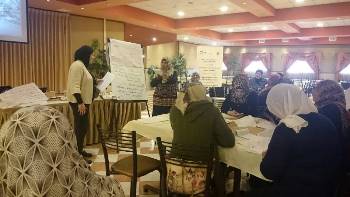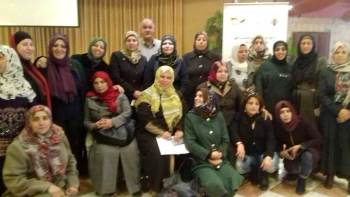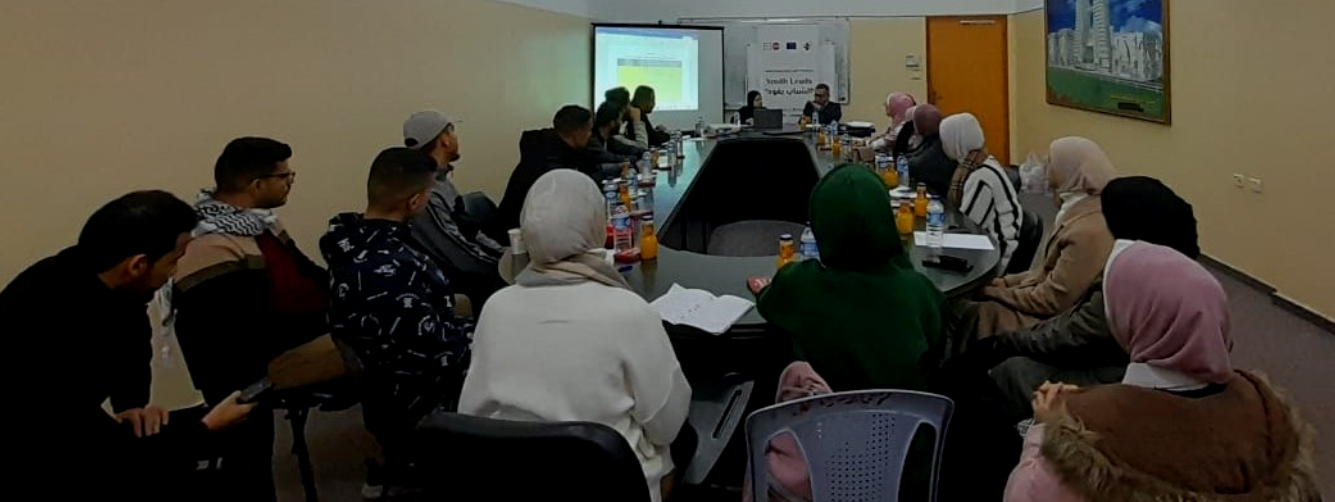
Dozens of local council members in the Hebron, Bethlehem districts recently completed training on decision-making mechanisms in local councils from a gender perspective. This was part of a series of trainings implemented by MIFTAH to promote Palestinian women’s participation in decision making at the local and community levels in order to enhance the capabilities of those looking to run in the 2016 local council elections. This will enable them to use decision-making mechanisms inside local councils as independent elected leaders. The project under which the training falls is entitled: “Supporting Women’s Active Leadership Roles in Local Government Units” implemented by MIFTAH in partnership with Deutsche Gesellschaft für Internationale Zusammenarbeit (GIZ). The project’s aim to help provide a supportive environment for joint interaction within local government units for the role of women and its importance in community development and decision-making.
Multitude of experiences
Abla Froukh, member of Saeer’s local council in the Hebron district, who is also a member of several committees within the council, says that before the course, she knew nothing about the local council law, which is no longer the case. Nor she says, did the participants have enough information on topics such as gender, communications or organizational charting. “Today we are more capable of discussing different subjects,”Froukh says. “We are better equipped to assume our role as members of the local council and as members of our community; we are able to address our fellow citizens better and actively participate in committee meetings. Overall, this has been a qualitative change for all of us.”
For Najah Manasra, member of the Bani Naim council, the training was an opportunity to practically deal with the public and learn ways of decision making. “We never had this chance in the past,” she said, adding that she acquired important skills in the training including how better to manage tasks inside the council. “We also contributed to raising awareness among our colleagues in dealing with the public, not to mention learning more about local council laws.” Beit Sahour town council member since 2012, Ula Khayr says this kind of training usually results in an improvement in performance among members and activists. She said the training offered the participants broader knowledge of the style and methodology of dialogue and ways of conveying information more efficiently.
At the individual level, Khayr says she aims to one day become mayor or a PLC member, which she knows necessitates even more experience and knowledge, one other reason why she is pushing for more advanced training.
For Zeinab Atiyeh, member of the Taqou’ village council in the Bethlehem region, the training helped her to acquire more knowledge and taught her the skill of networking, things she says are especially important in marginalized areas such as her own. She maintains that she now communicates better with her male colleagues in local councils, citing both her own confidence boost and the confidence of others in her abilities.
Motivation methodology
Gender expert Fida’Barghouthi, who has supervised the MIFTAH’s trainings since December, 2015, highlighted means of gender-responsive decision-making in local councils to the participants. She also showcased other experiences in this regard through the use of methodologies aimed at motivating more male and female citizens to participate in decision-making through active integration among local councils and sectors.
Supporting women’s leadership roles
MIFTAH Projects manager, Najwa Yaghi pointed out that the latest training was part of MIFTAH’s support for women’s leadership roles in local councils. She said a guidebook would be launched that focuses on decision-making mechanisms within local councils from a gender perspective within the first quarter of 2016 and which would support women to become more involved in the decision-making circles inside the local councils.
MIFTAH Programs Director Lamis Shuaibi meanwhile, reiterated that MIFTAH has always supported and encouraged women to reach decision-making positions and empower them with the readiness and qualifications to take on effective decision making posts at all levels.










